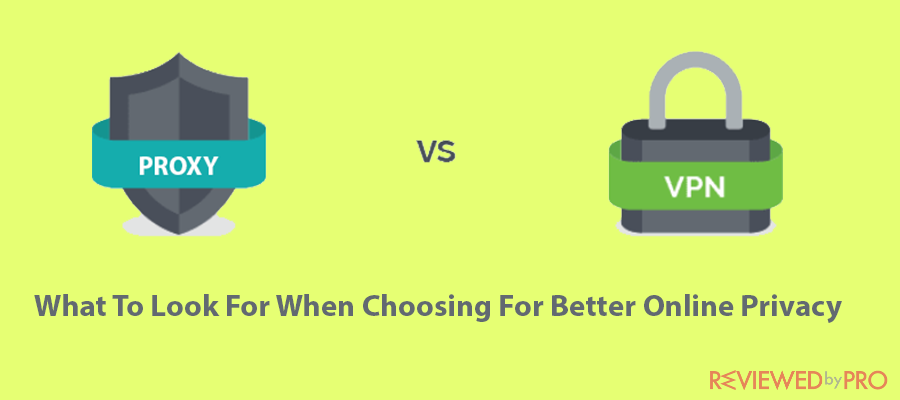
As online users, we are always looking for the best ways to preserve our online privacy and keep our identity private. The best way to do just that is using a proxy or VPN service.
While both provide privacy protection, they are different from each other. A secure and reliable VPN can easily unblock American Netflix from anywhere but there's no guarantee that a proxy can do that
How do you choose which one is the best for you? Read on to find out.
What is a Proxy?
A proxy acts as a link between you and the internet by redirecting internet traffic to the website you requested. The website's request to the end-user routes through the same proxy server.
When you connect to a proxy, your original IP address is hidden, and the proxy server's IP address displays to the rest of the world. Proxies are usually free or extremely inexpensive. A premium proxy will keep you safer and allow you to access websites with stringent regional restrictions.
How To Choose A Proxy?
Here are some things to keep in mind while selecting a proxy:
- Website unblocking servers – You might wish to double-check the websites you routinely unblock. Try out a few websites to see whether the proxy works appropriately.
- Compatibility — Note that not all proxy servers are compatible with all platforms and devices. You should double-check that it is compatible with your desired device.
- Cost – Most proxy servers are free and do not demand any payment. You can always use a premium proxy if you want superior service and security.
- User-friendliness — Ensure the proxy you're utilizing is simple to use.
- Ad-free- Finally, you'll want a proxy that doesn't clog up your device with adverts. A paid version of several proxies is available for ad-free viewing.
What is VPN?
A virtual private network (VPN) is a privacy technology that encrypts your data and sends it through a secure tunnel. It assigns you a new IP address while masking your current one. It enables you to access geographically restricted websites and apps.
How does a virtual private network (VPN) work? The service has servers located all around the globe. Your online activity will be channeled through an encrypted connection whenever you run a VPN program and subscribe to any country server. Your ISP and government won’t have access to your information.
VPN uses protocols such as PPTP point-to-point tunneling protocol (PPTP), L2TP layer-to-tunneling protocol (L2TP), secure socket tunneling protocol (SSTP), etc., to create tunnels. The service encrypts all of your data at various levels, ranging from 128-bit to 2048-bit.
How to Choose a VPN?
There are six easy criteria to consider while choosing a suitable VPN for use. These are the following:
- Logging Policy – A user must know a VPN's logging policy before subscribing to it. The privacy policy is found in the footer of their website. Look out for all the terms keenly to ensure that it does not save your browser history.
- Jurisdiction-After establishing that your preferred VPN does not store logs, proceed to determine your VPN’s exact location. Note that if you're in a 5-eyes country, your VPN server will probably give up your data to the government.
- Price – Examine the cost and contrast it with other VPN suppliers. Also, compare it to the features that these companies supply. After that, you will better understand how it operates.
- Encryption – Strong encryption will ensure that online users are better protected. 256-bit encryption is the industry standard for VPNs.
- Refund Policy – You are entitled to a refund if you are dissatisfied with the VPN you have chosen. As a result, you should opt for a VPN with a 30-day money-back guarantee.
- Compatibility – A Virtual private network must work with various devices and platforms, including Windows, Mac OS X, Linux, Android, iOS, Amazon devices, etc.
Proxy Vs. VPN: Key Differences
First, let us indulge in the four significant differences between a VPN and a Proxy server.
VPNs Encrypt All of Your Data
The most significant difference between VPN and the proxy server lies with the question about the greatest advantage of a VPN over the latter? All your online activities and communications exchanged are tagged secure using a VPN. It implies that nobody ever, including cybercriminals, government organizations, corporations, or others, can view your browsing endeavors.
Unlike Proxy Servers, VPN Services Increase Online Anonymity
VPN service, unlike the proxy, offers a no-log policy that guarantees you complete privacy. The service provider cannot save your data to give to anyone else who wants to know what websites you visit or what things you share. Your traffic is susceptible to constant monitoring and selling to third parties when using a free proxy.
The Free Proxy Connections May Be Slower
Although both proxy servers and VPNs can be slow when browsing, free proxy connections depend on how many people use these services. They are vulnerable to less security as they lack support and encryption.
With a VPN, You May Wind Up Spending More
While you can embrace free VPNs when establishing a connection, IT experts recommend paying for a VPN because they give more data protection, encrypted connections, and consistent performance.
Most providers use point-to-point tunneling technology (PTTP), which is linked to inconsistent security when using free VPN. On the other hand, a commercial VPN service provides more secure data encryption.
Conclusion
Virtual private networks (VPNs) are significantly more robust and reliable than proxies. If privacy and security are your primary concerns, a VPN is the only online tool that will meet your needs. A VPN establishes a secure tunnel via which your data is hidden. However, this is non-existent while using a Proxy.
Your ISP can simply intercept the data flow because it is open. If you choose a proxy and a VPN, you should go for the latter without hesitation. You must invest your money in the best privacy tool available.




